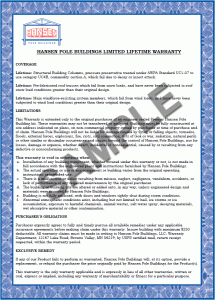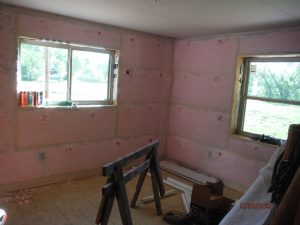Identifying Tempered Glass
Email all questions to: PoleBarnGuru@HansenPoleBuildings.com
DEAR POLE BARN GURU: Can you tell me if there is any method to identify glass as being tempered or not without breaking it? Many thanks in advance. SIMPLY SOPHIE
DEAR SIMPLY SOPHIE: All glass including mirrors used in hazardous locations as defined in the IBC and IRC codes (International Building Code and International Residential Code) requires the glazing to meet the requirements of CPSC (Consumer Product Safety Commission) 16 CFR 1201 and ANSI (American National Standards Institute) Z97.1. All tempered glass will have one or both of these standard numbers permanently etched in a corner of the glass. The only exception is when many small pieces of glass (not exceeding one square foot) are used in a large assembly. Then only one requires the etched logo but having a letter of compliance for all the others is always a good idea. Tempered glass is approximately four times as strong to impact as normal annealed glass.
DEAR POLE BARN GURU: I am sure this isn’t standard/common, but I bet you have been asked before. I have an existing pole barn with 13 ft. walls and 6/12 pitch roof. The barn is 90X40-ish with a standard straight bottom cord trusses resting on top of 6X6 posts and no overhang -knee boards on each end of truss. Trusses are 8 ft. on center and rest in a notch about 1/3 of the post diameter – concrete floor. I would like to convert half the barn to a basketball court for the family but the ceiling height is not sufficient. I would like to go up to 18 – 20 ft. in the center. Without removing the metal roof panels, can I install scissor trusses or metal trusses on the remaining top of the post, then remove the present trusses after new ones are secured? Of course, I would want to do this without compromising the integrity/safety of the design.
Thanks and I look forward to your response. NEEDING HEIGHT IN HASTINGS
DEAR NEEDING:
Could it be done? Maybe, however the time, effort, cost and degree of success from the outcome could be limiting.
The first consideration is the amount of height you would even gain. It is doubtful you will get a bottom chord slope of greater than 3/12, which will make the height dead center only 5′ more in rise at the sides. Don’t try any three point shots from along the sidelines.
Assuming you really want to do this – I’d order two pre-fabricated wood scissors trusses for each sidewall column, installing one on each side of the post – up tight to the underside of the roof purlins. Once properly anchored, the existing trusses could be cut out in between the scissors trusses.
Bearing blocks would need to be placed under each new truss, with a sufficient number of nails and/or other connectors to resist gravity forces. Each roof purlin will also need to be attached to the top chord of the new truss. A Simpson H-1 hanger would work well for this purpose. The trusses will need to have adequate blocking placed between them, so they do not buckle inwards towards each other, and the required web and bottom chord bracing would need to be added.









